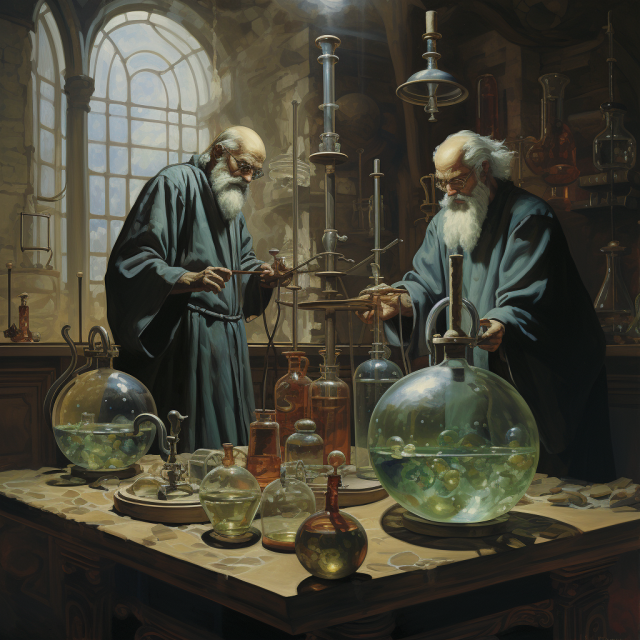What Is the Goal of Alchemy?: Imagine embarking on a transformative journey, where base materials are transmuted into precious substances and the alchemist seeks to unlock the secrets of the universe. In this article, we delve into the mysterious world of alchemy, exploring its origins, impact on science and philosophy, and the quest for immortality. By unraveling the symbolism behind alchemical processes, we uncover the true goal of this ancient practice: spiritual transformation. Prepare to be captivated by the profound wisdom hidden within the alchemist’s crucible.
The Origins of Alchemy
You may be wondering about the origins of alchemy and how it came to be practiced. Alchemy, as we know it today, has its roots in ancient civilizations such as Egypt, Greece, and China. The word “alchemy” itself is derived from the Arabic word “al-kīmiyā”, which means “the art of transformation.”
The practice of alchemy can be traced back thousands of years, with the earliest known records dating back to the Hellenistic period in Egypt. During this time, alchemy was closely associated with metallurgy and the search for ways to transform base metals into gold. It was believed that by achieving this transformation, one could also attain spiritual enlightenment and immortality.
In ancient China, alchemy was known as “daoyin” and was closely tied to Taoist philosophy. Chinese alchemists sought to harmonize the energies of the body, mind, and spirit through various practices such as meditation, breathing exercises, and the use of herbal medicines. They believed that by achieving this harmony, one could attain immortality and spiritual transcendence.
Alchemy also played a significant role in the development of Western medicine and chemistry. During the Middle Ages, alchemy was practiced in Europe, with alchemists working in secret laboratories, conducting experiments, and searching for the philosopher’s stone, a mythical substance believed to hold the key to immortality and the transformation of base metals into gold.
Alchemy’s Influence on Science and Philosophy
The influence of alchemy on science and philosophy can be seen in various ways. Alchemy, with its emphasis on experimentation and the search for knowledge, laid the groundwork for the development of modern scientific methods and principles. In the realm of science, alchemists made significant contributions to fields such as chemistry, medicine, and metallurgy.
Alchemy’s focus on transmutation, the transformation of one substance into another, led to the discovery and understanding of various chemical processes. Alchemists developed techniques for distillation, filtration, and purification, which are still fundamental in modern chemistry. They also conducted experiments with different substances, exploring their properties and reactions. These early experiments laid the foundation for the scientific method, a systematic approach to inquiry that is still used today.
In addition to its impact on science, alchemy also influenced philosophy. Alchemists sought to uncover the secrets of nature and the universe, often using symbolic language and mystical concepts. Their pursuit of the philosopher’s stone, a mythical substance believed to have transformative properties, represented a quest for spiritual enlightenment and knowledge. This blending of scientific inquiry and spiritual exploration had a profound influence on philosophical thought.
Alchemy’s influence on science and philosophy can be seen in the development of new ideas and theories. The alchemical principles of transformation and transmutation paved the way for the discovery of elements and the understanding of chemical reactions. Alchemists’ use of symbolic language and mystical concepts also influenced philosophical and metaphysical thinking.
Overall, alchemy’s impact on science and philosophy cannot be overstated. It provided the groundwork for modern scientific methods and principles, and its blending of scientific inquiry and spiritual exploration opened up new avenues of thought. The influence of alchemy can be seen in the way we approach and understand the world today.

The Alchemical Quest for Immortality
Discovering the elixir of life, alchemists believed that immortality could be achieved through their relentless pursuit of knowledge and transformation. In their quest for eternal life, alchemists sought to unlock the secrets of nature and harness its power for their own benefit. They believed that by understanding the underlying principles of the universe, they could manipulate the elements and transcend the limitations of mortality.
Alchemy, as a philosophical and scientific discipline, was deeply rooted in the belief that the world was composed of four fundamental elements: earth, water, air, and fire. Alchemists believed that these elements could be transformed and purified through various processes, leading to the creation of the fabled philosopher’s stone. This mythical substance was said to possess extraordinary powers, including the ability to grant eternal life.
To achieve the elusive goal of immortality, alchemists dedicated themselves to the study of chemistry, medicine, astrology, and spiritual practices. They meticulously recorded their experiments and observations, striving to uncover the secrets of nature’s transformative processes. By distilling, combining, and purifying materials, alchemists sought to transmute base metals into gold and create the elixir of life.
The alchemical quest for immortality was not limited to physical transformations; it also encompassed spiritual and philosophical growth. Alchemists believed that the pursuit of knowledge and self-transformation was essential for achieving eternal life. Through the refinement of their own souls, alchemists aimed to attain a state of enlightenment and transcendence.
Although alchemists were unable to discover the key to immortality, their quest had profound effects on the development of science and philosophy. Their systematic approach to experimentation, observation, and documentation laid the foundation for modern scientific methods. Furthermore, their exploration of the interconnectedness between the physical and spiritual realms influenced the development of mystical and esoteric traditions.
Exploring the Symbolism of Alchemical Processes
By exploring the symbolism behind alchemical processes, you can gain a deeper understanding of the transformative nature of the pursuit for immortality. Alchemy, with its intricate rituals and mysterious symbols, offers a rich tapestry of metaphors that represent the journey towards spiritual and physical transformation.
- The Philosopher’s Stone: This legendary substance is often depicted as the ultimate goal of alchemy. It symbolizes the attainment of enlightenment and the union of opposites. Just as the Philosopher’s Stone is believed to possess the power to transmute base metals into gold, it represents the alchemist’s quest to transmute their own base nature into a purified state.
- The Prima Materia: This concept refers to the formless and chaotic substance from which all matter is believed to originate. It symbolizes the raw potential within each individual, waiting to be harnessed and transformed. The alchemist’s task is to purify and refine this primal material, unlocking its hidden wisdom and power.
- The Four Elements: Alchemy associates the four elements – fire, water, air, and earth – with different stages of the alchemical process. These elements represent different aspects of the alchemist’s psyche and the transformative journey. For example, fire symbolizes purification and the burning away of impurities, while water represents dissolution and the breaking down of old patterns.
- The Union of Opposites: Alchemy often emphasizes the need to reconcile opposing forces within oneself. This union of opposites, such as masculine and feminine, light and dark, symbolizes the integration of all aspects of the self. By embracing and integrating these opposing forces, the alchemist seeks to achieve wholeness and transcendence.
Exploring the symbolism of alchemical processes provides insights into the profound and transformative nature of the pursuit for immortality. It reveals the alchemist’s journey towards self-realization, purification, and the ultimate union of opposites. Through these symbols, alchemy offers a roadmap for personal growth and spiritual evolution.
Alchemy’s Role in Spiritual Transformation
As you explore the role of alchemy in spiritual transformation, you will discover its profound influence on the journey towards self-realization and the integration of opposing forces. Alchemy, with its roots in ancient wisdom and mystical practices, has long been associated with the quest for inner transformation and the attainment of spiritual enlightenment. It is a path that seeks to transmute the base elements of one’s being into gold, metaphorically speaking, by awakening and integrating the dormant aspects of the self.
In the pursuit of self-realization, alchemy provides a framework for understanding the process of spiritual transformation. It recognizes that within each individual, there exists a multitude of opposing forces, such as light and shadow, masculine and feminine, conscious and unconscious. These opposing forces are represented by various symbols in alchemical texts, such as the sun and moon, the lion and eagle, and the alchemical wedding.
To illustrate the transformative power of alchemy, let us consider a three-column, four-row table:
| Opposing Forces | Alchemical Symbols | Integration |
|---|---|---|
| Light and Shadow | Sun and Moon | Union of opposites, embracing both aspects |
| Masculine and Feminine | King and Queen | Balance and harmony between the sexes |
| Conscious and Unconscious | Sol and Luna | Integration of conscious and unconscious mind |
| Matter and Spirit | Salt and Sulfur | Balancing material and spiritual pursuits |
As you can see, alchemy offers a framework for understanding and integrating these opposing forces, allowing for the realization of one’s true self. Through the process of transformation, alchemy helps individuals transcend their limited ego identities and connect with their higher selves. It is a journey of self-discovery and self-mastery, leading to spiritual enlightenment and a deeper understanding of the divine within.
Unveiling the True Goal of Alchemical Practice
To truly understand the purpose of alchemical practice, you must delve into the depths of its teachings and uncover the profound wisdom it holds. Alchemy, often misunderstood as a primitive precursor to modern chemistry, goes far beyond the transmutation of base metals into gold. It is a spiritual and philosophical tradition that seeks to transform not only physical substances, but also the practitioner’s inner self. The goal of alchemical practice is nothing short of achieving spiritual enlightenment and ultimate self-realization.
In this pursuit of spiritual transformation, alchemists employ various techniques and rituals aimed at purifying and purging the impurities of the soul. The true goal of alchemy can be summarized by the following:
- **The Great Work**: Alchemy sees spiritual transformation as a lifelong process, referred to as the Great Work. It entails the purification of the soul, the union of opposites, and the attainment of spiritual wholeness and harmony.
- **The Philosopher’s Stone**: The Philosopher’s Stone, often depicted as a mythical substance, is not merely a physical object. It symbolizes the perfected state of the alchemist’s soul, achieved through the transmutation of their inner self.
- **Union of Body, Mind, and Spirit**: Alchemy emphasizes the integration of body, mind, and spirit. It seeks to unify these aspects of the self, leading to a state of balance and harmony.
- **Transformation of Consciousness**: Alchemical practice aims to transcend the limitations of the ego and expand consciousness. It involves the exploration and integration of the unconscious mind, leading to a heightened state of awareness and spiritual awakening.

Frequently Asked Questions
How Did Alchemy Evolve Over Time and What Were Its Major Influences on Other Fields of Study?
Over time, alchemy evolved and had major influences on other fields of study. It went through a transformation as new ideas and discoveries emerged. Alchemy’s goal was to transmute base metals into gold and find the elixir of life. But beyond these material pursuits, alchemy became a precursor to modern chemistry. It influenced fields like medicine, metallurgy, and philosophy. Alchemists’ experiments and methodologies laid the foundation for scientific inquiry and the understanding of natural phenomena.
What Were Some of the Most Famous Alchemists in History and What Contributions Did They Make to the Field?
Some of the most famous alchemists in history were dedicated to unraveling the mysteries of the natural world. Their contributions revolutionized the field by discovering new elements, experimenting with chemical reactions, and developing complex theories. These alchemists paved the way for modern chemistry and laid the foundation for scientific inquiry. Through their tireless efforts, they sought to understand the secrets of transmutation, immortality, and the philosopher’s stone. Their achievements continue to inspire and intrigue scientists to this day.
Can the Principles and Practices of Alchemy Be Applied in Modern Scientific Research?
In modern scientific research, the principles and practices of alchemy can indeed be applied. By understanding the foundations of alchemy, you can gain insights into the transformation of substances and the pursuit of knowledge. Alchemical concepts like transmutation and the search for the philosopher’s stone can be seen as metaphors for the advancements in chemistry and the quest for new materials. By studying alchemy, scientists can explore alternative approaches and gain a deeper understanding of the natural world.
How Did Alchemical Symbolism Contribute to the Development of Psychological Theories, Such as Carl Jung’s Concept of the Collective Unconscious?
How did alchemical symbolism contribute to the development of psychological theories like Carl Jung’s concept of the collective unconscious? Alchemical symbols, with their rich and layered meanings, provided Jung with a framework to understand the depths of the human psyche. These symbols acted as a bridge between the conscious and unconscious mind, helping Jung explore the hidden aspects of the human experience. By delving into the transformative processes depicted in alchemy, Jung gained insights into the workings of the collective unconscious and its archetypal patterns.
Are There Any Modern-Day Practices That Can Be Considered as a Continuation or Revival of Alchemical Traditions?
There are several modern-day practices that can be considered as a continuation or revival of alchemical traditions. These practices often involve the exploration of personal transformation and self-discovery through the metaphorical language of alchemy. Some examples include depth psychology, which draws upon alchemical symbolism to understand the human psyche, and spiritual alchemy, which seeks to cultivate inner growth and spiritual enlightenment. These practices continue to resonate with individuals who are interested in the pursuit of personal and spiritual development.
Conclusion
As you journey through the intricate world of alchemy, you begin to grasp the true goal that lies within. It is not merely the pursuit of immortality or the transformation of base metals into gold. No, the essence of alchemy is a profound spiritual journey, a quest for the inner transformation of the self. It is the alchemical process of transmuting the leaden aspects of our being into the golden light of enlightenment, awakening our souls to their true potential.

